1. Bdeir M, Bahous R, Nabhani M. Improving reading readiness in kindergarten children through early phonological awareness interventions. 2022;50(3):348–60. [
DOI]
2. Soleymani Z, Dastjerdi Kazemi M. Determining the validity and reliability of Phonological Awareness Test. Journal of Psychology. 2005;9(1):82–100. [Persian]
3. Hessling Prahl A, Jones R, Melanie Schuele C, Camarata S. Phonological awareness intervention using a standard treatment protocol for individuals with Down syndrome. Child Lang Teach Ther. 2022;38(1):22–42. [
DOI]
4. Newbury J, Justice LM, Jiang HH, Schmitt MB. Cognitive, noncognitive, and home environment correlates of reading difficulties in primary-grade students with language impairment. J Speech Lang Hear Res. 2020;63(6):1933–46. [
DOI]
5. Memisevic H, Dedic A, Biscevic I, Hadzic S, Pasalic A, Malec D. Identifying predictors of reading speed and reading comprehension in Bosnian. Appl Neuropsychol Child. 2022;11(3):297–306. [
DOI]
6. Veríssimo L, Costa M, Miranda F, Pontes C, Castro I. The importance of phonological awareness in learning disabilities' prevention: perspectives of preschool and primary teachers. Front Educ. 2021;6:750328. [
DOI]
7. Wanzek J, Al Otaiba S, McMaster KL. Intensive reading interventions for the elementary grades. First Edition. New York: Guilford Publications; 2019.
8. Fernández-Otoya FA, Raposo-Rivas M, Halabi-Echeverry AX. a qualitative systematic literature review on phonological awareness in preschoolers supported by information and communication technologies. Education Sciences. 2022;12(6):382. [
DOI]
9. Ghasemtabar SN, Yousefi N, Hosseini M, Daneshmand B. Music training: an effective strategy for phonological development of preschoolers. Journal of Educational Psychology. 2020:16(57):1–19. [Persian] [
Article]
10. Elmonayer RA. Promoting phonological awareness skills of Egyptian kindergarteners through dialogic reading. Early Child Development and Care. 2013;183(9):1229–41. [
DOI]
11. Lefebvre P, Trudeau N, Sutton A. Enhancing vocabulary, print awareness and phonological awareness through shared storybook reading with low-income preschoolers. J Early Child Lit. 2011;11(4):453–79. [
DOI]
12. Cheung H, Chen HC, Lai CY, Wong OC, Hills M. The development of phonological awareness: effects of spoken language experience and orthography. Cognition. 2001;81(3):227–41. [
DOI]
13. Morris T, Leavey G. Promoting phonological awareness in nursery‐aged children through a sure start early listening programme. Int J Early Years Educ. 2006;14(2):155–68. [
DOI]
14. Bietti LM, Tilston O, Bangerter A. Storytelling as adaptive collective sensemaking. Top Cogn Sci. 2019;11(4):710–32. [
DOI]
15. Fox Eades JM. Classroom tales: Using storytelling to build emotional, social and academic skills across the primary curriculum. First edition. London: Jessica Kingsley Publishers; 2005.
16. Bartan M. The use of storytelling methods by teachers and their effects on children's understanding and attention span. Southeast Asia Early Childhood Journal. 2020;9(1):75–84. [
DOI]
17. Yazıcı E, Bolay H. Story based activities enhance literacy skills in preschool children. Universal Journal of Educational Research. 2017;5(5):815–23. [
DOI]
18. Bazargan S. Our pitch trainer's guide and what's in it. Tehran: School Pub; 2020. [Persian]
19. Polit DF, Beck CT, Owen SV. Is the CVI an acceptable indicator of content validity? Appraisal and recommendations. Research in Nursing & Health. 2007;30(4):459–67. [
DOI]
20. Tabieh AAS, Al-Hileh MM, Afifa HMJA, Abuzagha HY. The effect of using digital storytelling on developing active listening and creative thinking skills. European Journal of Educational Research. 2021;10(1):13–21. [
DOI]
21. Ayobami O, Adedigba O. Effect of phonological awareness strategy on pupils'learning outcome in reading in ado-ekiti local government area. Unilorin Journal of Lifelong Education. 2023;4:10–19.
22. Rezaei A, Mousanezhad Jeddi E. The contributions of attentional control components, phonological awareness, and working memory to reading ability. J Psycholinguist Res. 2020;49(1):31–40. [
DOI]
23. Kostelnik MJ, Soderman AK, Rupiper M, Whiren AP. Developmentally appropriate curriculum: Best practices in early childhood education. 7th edition. London: Pearson; 2018.
24. Bodrova E. Make‐believe play versus academic skills: a Vygotskian approach to today's dilemma of early childhood education. European Early Childhood Education Research Journal. 2008;16(3):357–69. [
DOI]
25. Isbell R, Sobol J, Lindauer L, Lowrance A. The effects of storytelling and story reading on the oral language complexity and story comprehension of young children. Early Childhood Education Journal. 2004;32(3):157–63. [
DOI]
26. Roney RC. Storytelling in the classroom: some theoretical thoughts. Story Telling. 1996;9:7–9.
27. Knoop‐van Campen CAN, Segers E, Verhoeven L. How phonological awareness mediates the relation between working memory and word reading efficiency in children with dyslexia. Dyslexia. 2018;24(2):156–69. [
DOI]
28. McGregor I, Holmes JG. How storytelling shapes memory and impressions of relationship events over time. J Pers Soc Psychol. 1999;76(3):403–19. [
DOI]
29. Bialystok E. Factors in the growth of linguistic awareness. Child Dev. 1986;57(2):498. [
DOI]
30. Bialystok E. Cognitive complexity and attentional control in the bilingual mind. Child Dev. 1999;70(3):636–44. [
DOI]
31. Hipfner-Boucher K, Milburn T, Weitzman E, Greenberg J, Pelletier J, Girolametto L. Relationships between preschoolers' oral language and phonological awareness. First Language. 2014;34(2):178–97. [
DOI]






